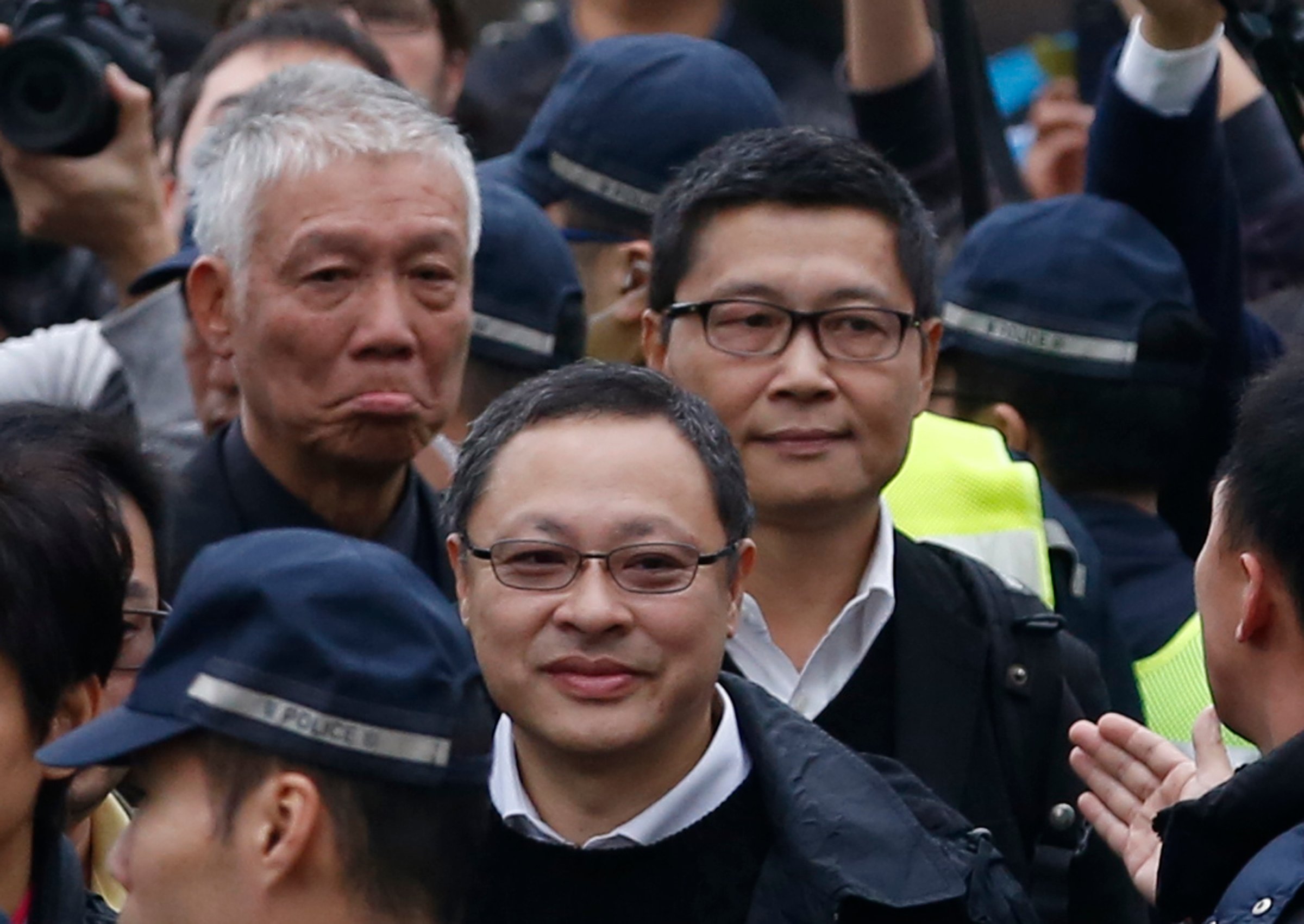
Police turned away the founders of a leading pro-democracy group in Hong Kong who attempted to surrender on Wednesday for their role in organizing the ongoing street sit-ins for free elections here.
Hong Kong University law professor Benny Tai, Chinese University social-studies professor Chan Kin-man and Baptist cleric the Rev. Chu Yiu-ming sought to turn themselves in for violating Hong Kong laws on unlawful assembly. But they left Central Police Station less than an hour later, still free men.
They were joined in seeking arrest by several other high-profile supporters of the movement, including the Catholic Cardinal Joseph Zen, who also walked in, and then out, of the police station.
“We are not being arrested,” said Tai, speaking to press outside the station. He added, though, that he believed police might still arrest him and others at a later stage and charge them with more serious crimes.
The three had called for demonstrators to occupy Hong Kong’s Central district, the city’s financial heart, to protest Beijing’s insistence on vetting candidates standing for chief executive, Hong Kong’s top political post.
Chan originally told TIME that they planned to end the protests on Oct. 1, but weeks later the occupation of downtown areas continues, fueled by student groups who disagree with Occupy Central on both timing and tactics.
The group also quickly found that it was not able to control the location of the protests, after students occupied the Admiralty district (location of the Central Government Offices), the shopping hub of Causeway Bay and the blue-collar Mong Kok quarter of Kowloon, instead of the Central location originally stipulated.
Though the group supported the sit-ins, and continued to lend the name Occupy Central to the protests, its leaders were an increasingly infrequent presence in the occupied areas, as they ceded control over the direction of the movement to two student groups, the Hong Kong Federation of Students and Scholarism.
In recent weeks, the trio has joined some other initial supporters of the sit-ins in deciding that it is time for the occupations to end, especially after the police began to use greater force.
“For the sake of the occupiers’ safety, for the sake of the original intention of love and peace … we three urge the students to retreat,” read a statement from the group after violent clashes Sunday. It added: “We respect the students’ and citizens’ determination to fight for democracy, and we are furious at the government’s heartless indifference.”
Calling the movement for free elections in Hong Kong “a long-term struggle,” the trio encouraged students to “recuperate and build up strength.” The movement, they said, could continue through other means, including efforts to “extend [its] spirit” by reaching out to local communities.
Speaking outside the police station, Tai told TIME that his next move depended on “what happens with the occupation.” For now, he said he was going home. “I have some things I need to finish writing,” he said.
Though the Occupy Central founders said they hoped to “bear the legal consequences” on the students’ behalf, an unnamed police source told the South China Morning Post that the trio are among some 200 people identified for investigation over the pro-democracy movement.
Scores of protesters have already been arrested for their roles in more than 10 weeks of protests. Police said that 40 people were arrested during the Sunday night confrontations in Admiralty district, while 12 others were arrested that night in parallel demonstrations across Victoria Harbor in Mong Kok.
Joshua Wong, a student protest leader who features in TIME’s Person of the Year poll, was charged last week with obstructing public officials clearing the restive Mong Kok site. He is out on bail and, along with two other young protesters, began a hunger strike on Monday to press the government for the right to free elections in Hong Kong.
Hong Kong’s Chief Executive Leung Chun-ying has replied that he wishes the students good health, but that “any resistance is futile.”
More Must-Reads from TIME
- Donald Trump Is TIME's 2024 Person of the Year
- Why We Chose Trump as Person of the Year
- Is Intermittent Fasting Good or Bad for You?
- The 100 Must-Read Books of 2024
- The 20 Best Christmas TV Episodes
- Column: If Optimism Feels Ridiculous Now, Try Hope
- The Future of Climate Action Is Trade Policy
- Merle Bombardieri Is Helping People Make the Baby Decision
Write to Elizabeth Barber / Hong Kong at elizabeth.barber@timeasia.com